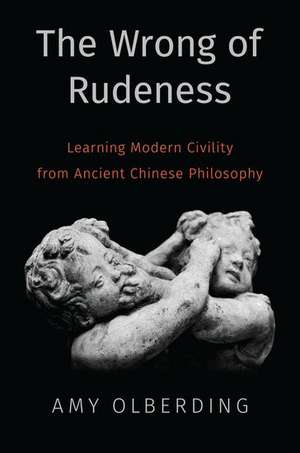The Wrong of Rudeness: Learning Modern Civility from Ancient Chinese Philosophy
Autor Amy Olberdingen Limba Engleză Hardback – 26 sep 2019
Preț: 320.09 lei
Nou
Puncte Express: 480
Preț estimativ în valută:
61.26€ • 66.52$ • 51.46£
61.26€ • 66.52$ • 51.46£
Carte disponibilă
Livrare economică 01-15 aprilie
Preluare comenzi: 021 569.72.76
Specificații
ISBN-13: 9780190880965
ISBN-10: 0190880961
Pagini: 198
Dimensiuni: 211 x 145 x 23 mm
Greutate: 0.32 kg
Editura: Oxford University Press
Colecția OUP USA
Locul publicării:New York, United States
ISBN-10: 0190880961
Pagini: 198
Dimensiuni: 211 x 145 x 23 mm
Greutate: 0.32 kg
Editura: Oxford University Press
Colecția OUP USA
Locul publicării:New York, United States
Recenzii
...I found the book a most enjoyable read and would recommend it to readers who want to learn about Confucianism and the Confucian fascination with manners. The book is also a must to those who are — like myself — intrigued about the human motivation to be civil and rude.
this is clearly a book for the times. It challenges the reader to reflect more carefully on the costs of tribalism and incivility, at a time when reasonable people are increasingly tempted by them. This richly imaginative exercise in renewing civic life deserves the widest possible audience.
The book is deeply humane, surprisingly inspiring, and sprinkled with a gentle humor, all of which make for delightfully edifying reading. Olberding doesn't dazzle with lofty ideals, although there are lofty ideals of humanity and sociability that guide the book. Instead, drawing on everyday experiences, she patiently reveals the deep attractions of doing the hard work to cultivate civil and mannerly habits, of following seemingly trivial rules of etiquette, and of resisting the temptations to rudeness or indifference that beset our rattier selves. This is a beautiful book about the importance of our shared struggle to sustain human connection.
"In this deeply personal book, philosopher Amy Olberding brilliantly shows how ancient Confucians can help us to grasp the centrality of manners and civility to good lives today. The Wrongness of Rudeness has important lessons for anyone who has ever struggled to be polite -- or wondered whether it's worth the bother." -- Stephen C. Angle, Mansfield Freeman Professor of East Asian Studies, Wesleyan University
this is clearly a book for the times. It challenges the reader to reflect more carefully on the costs of tribalism and incivility, at a time when reasonable people are increasingly tempted by them. This richly imaginative exercise in renewing civic life deserves the widest possible audience.
The book is deeply humane, surprisingly inspiring, and sprinkled with a gentle humor, all of which make for delightfully edifying reading. Olberding doesn't dazzle with lofty ideals, although there are lofty ideals of humanity and sociability that guide the book. Instead, drawing on everyday experiences, she patiently reveals the deep attractions of doing the hard work to cultivate civil and mannerly habits, of following seemingly trivial rules of etiquette, and of resisting the temptations to rudeness or indifference that beset our rattier selves. This is a beautiful book about the importance of our shared struggle to sustain human connection.
"In this deeply personal book, philosopher Amy Olberding brilliantly shows how ancient Confucians can help us to grasp the centrality of manners and civility to good lives today. The Wrongness of Rudeness has important lessons for anyone who has ever struggled to be polite -- or wondered whether it's worth the bother." -- Stephen C. Angle, Mansfield Freeman Professor of East Asian Studies, Wesleyan University
Notă biografică
Amy Olberding is Presidential Professor of Philosophy at the University of Oklahoma. Her work focuses on early Chinese ethics. She is the author of Moral Exemplars in the Analects (Routledge, 2011), several academic journal articles, and she has also published work with Aeon, The Forum, and The Chronicle of Higher Education. When not studying and teaching philosophy, she farms.
